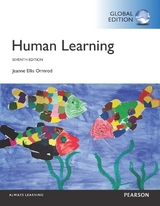
Human Learning: Pearson New International Edition
Pearson Education Limited (Verlag)
978-1-292-02314-4 (ISBN)
- Titel erscheint in neuer Auflage
- Artikel merken
The market-leading education textbook on learning theories, Human Learning, Sixth Edition, covers a broad range of concepts and is supported by the author's lucid and engaging writing style, which helps readers learn the book's content meaningfully.
In this new sixth edition, readers will find significant updates to reflect the most current research in the field, including: expansion of the chapter on cognition and memory; re-organization of content on Piaget and Vygotsky into two separate chapters; a core section on teaching critical-thinking skills; and the significantly revised discussion of technology-based instructed. Instructors and students alike can feel confident in learning about learning with this influential and best-selling author. Over the years, Jeanne E. Ormrod has received many unsolicited e-mail messages from students who tell her how much they've enjoyed and appreciated previous editions of Human Learning.
PART I. INTRODUCTION TO HUMAN LEARNING
Chapter 1. Learning and the Brain
Basic Building Blocks of the Human Nervous System
Neurons
Synapses
Glial Cells
Brain Structures and Functions
Methods in Brain Research
Parts of the Brain
The Left and Right Hemispheres
Interconnectedness of Brain Structures
Development of the Brain
Prenatal Development
Development in Infancy and Early Childhood
Development in Middle Childhood, Adolescence, and Adulthood
Factors Influencing Brain Development
To What Extent Are There Critical Periods in Brain Development?
To What Extent Is the Brain "Prewired" to Know or Learn Things?
The Physiological Basis of Learning
Educational Implications of Brain Research
Summary
Chapter 2. Perspectives on Learning
The Importance of Learning
Defining Learning
Determining When Learning Has Occurred
Research, Principles, and Theories
How Theories of Learning Have Evolved over Time
Advantages of Theories
Potential Drawbacks of Theories
A Perspective on Theories and Principles
Applying Knowledge about Learning to Instructional Practice
Overview of the Book
Summary
PART II. BEHAVIORIST VIEWS OF LEARNING
Chapter 3. Behaviorism and Classical Conditioning
Basic Assumptions of Behaviorism
Classical Conditioning
The Classical Conditioning Model
Classical Conditioning in Human Learning
Common Phenomena in Classical Conditioning
Cognition in Classical Conditioning
Changing Undesirable Conditioned Responses
Educational Implications of Behaviorist Assumptions and Classical Conditioning
Summary
Chapter 4. Instrumental Conditioning
Thorndike's Early Research
Rewards and Reinforcement
Skinner's Operant Conditioning
The Various Forms That Reinforcement Can Take
Punishment
Effective Forms of Punishment
Ineffective Forms of Punishment
Common Phenomena in Instrumental Conditioning
Superstitious Behavior
Shaping
Chaining
Extinction
Effects of Reinforcement Schedules
Avoidance Learning
Effects of Antecedent Stimuli and Responses in Instrumental Conditioning
Cueing
Setting Events
Generalization
Stimulus Discrimination
Behavioral Momentum
Cognition and Motivation in Instrumental Conditioning
Summary
Chapter 5. Applications of Instrumental Conditioning
Applying Behaviorist Principles to Classroom Management
Concerns about Using Reinforcement and Punishment in the Classroom
Using Reinforcement to Increase Desirable Behaviors
Strategies for Decreasing Undesirable Behaviors
Applied Behavior Analysis
Using Applied Behavior Analysis with Large Groups
Adding a Cognitive Component to ABA
Instructional Objectives
Behavioral Objectives
Current Perspectives on Instructional Objectives
Usefulness and Effectiveness of Objectives
Formulating Different Levels of Objectives
Programmed Instruction and Computer-Assisted Instruction
Effectiveness of PI and CAI
Mastery Learning
Keller's Personalized System of Instruction (PSI)
Effectiveness of Mastery Learning and PSI
When Behaviorist Techniques Are Most Appropriate
Summary
PART III. SOCIAL COGNITIVE THEORY
Chapter 6. Social Cognitive Theory
General Principles of Social Cognitive Theory
Environmental Factors in Social Learning: Revisiting Reinforcement and Punishment
Problems with a Strict Behaviorist Analysis of Social Learning
Cognitive Factors in Social Learning
Reciprocal Causation
Modeling
How Modeling Affects Behavior
Characteristics of Effective Models
Behaviors That Can Be Learned through Modeling
Conditions Necessary for Effective Modeling to Occur
Self-Efficacy
How Self-Efficacy Affects Behavior and Cognition
Factors in the Development of Self-Efficacy
Self-Regulation
Elements of Self-Regulation
Promoting Self-Regulated Behavior
The Cognitive Side of Self-Regulation
Educational Implications of Social Cognitive Theory
Summary
PART IV. COGNITIVE VIEWS OF LEARNING
Chapter 7. Introduction to Cognitivism
Edward Tolman's Purposive Behaviorism
Gestalt Psychology
Verbal Learning Research
Introduction to Contemporary Cognitivism
General Assumptions of Cognitive Theories
Information Processing Theory
Constructivism
Contextual Theories
Integrating Cognitive Perspectives
General Educational Implications of Cognitive Theories
Summary
Chapter 8. Basic Components of Memory
A Dual-Store Model of Memory
Sensory Register
Moving Information to Working Memory: The Role of Attention
Working Memory
Moving Information to Long-Term Memory: Connecting New Information with Prior
Knowledge
Long-Term Memory
Challenges to the Dual-Store Model
Are Working Memory and Long-Term Memory Really Different?
Is Conscious Thought Necessary for Long-Term Memory Storage?
Alternative Views of Human Memory
Levels of Processing
Activation
Remembering That The Map Is Not the Territory
Generalizations about Memory and Their Educational Implications
Summary
Chapter 9. Long-Term Memory I: Storage and Encoding
Construction in Storage
Examples of Construction in Action
Long-Term Memory Storage Processes
Selection
Rehearsal
Meaningful Learning
Internal Organization
Elaboration
Visual Imagery
How Procedural Knowledge Is Acquired
Does New Knowledge Require a Consolidation Period?
Factors Affecting Long-Term Memory Storage
Working Memory
Prior Knowledge
Prior Misconceptions
Expectations
Verbalization
Enactment
Repetition and Review
Promoting Effective Storage Processes
Some Final Remarks about Long-Term Memory Storage
Summary
Chapter 10. Long-Term Memory II: The Nature of Knowledge
The Various Kinds of Knowledge
Declarative and Procedural Knowledge
Explicit and Implicit Knowledge
How Knowledge Is Encoded in Long-Term Memory
Encoding in Terms of Physical Characteristics
Encoding in Terms of Actions
Encoding in Terms of Symbols
Encoding in Terms of Meanings
Different Forms of Encoding Are Not Mutually Exclusive
The Organization of Long-Term Memory
Long-Term Memory as a Hierarchy
Long-Term Memory as a Network
Parallel Distributed Processing
Concepts
Theories of Concept Learning
Factors Facilitating Concept Learning
Schemas and Scripts
Personal Theories
Personal Theories versus Reality
Fostering Theory Development
Worldviews
The Challenge of Conceptual Change
Promoting Conceptual Change
Development of Expertise
Generalizations about the Nature of Knowledge
Summary
Chapter 11. Long-Term Memory III: Retrieval and Forgetting
How Retrieval Works
Retrieval Cues
Construction in Retrieval
The Power of Suggestion: Effects of Subsequently Presented
Information
Constructing Entirely New "Memories"
Remembering Earlier Recollections
Self-Monitoring During Retrieval
Important Cautions in Probing People's Memories
Forgetting
Decay
Interference and Inhibition
Repression
Failure to Retrieve
Construction Error
Failure to Store or Consolidate
The Case of Infantile Amnesia
General Principles of Retrieval for Instructional Settings
Summary
PART V. DEVELOPMENTAL AND CONTEXTUAL PERSPECTIVES
Chapter 12. Cognitive-Developmental Perspectives
Piaget's Theory of Cognitive Development
Key Ideas in Piaget's Theory
Piaget's Stages of Cognitive Development
Current Perspectives on Piaget's Theory
Capabilities of Different Age-Groups
Effects of Experience and Prior Knowledge
Effects of Culture
Views on Piaget's Stages
Neo-Piagetian Theories of Cognitive Development
Case's Theory
Implications of Piagetian and Neo-Piagetian Theories
Summary
Chapter 13. Sociocultural Theory and Other Contextual Perspectives
Vygotsky's Theory of Cognitive Development
Key Ideas in Vygotsky's Theory
Comparing Piaget's and Vygotsky's Theories
Current Perspectives on Vygotsky's Theory
Social Construction of Meaning
Scaffolding
Participation in Adult Activities
Apprenticeships
Acquisition of Teaching Skills
Dynamic Assessment
Adding a Sociocultural Element to Information Processing Theory
Intersubjectivity
Social Construction of Memory
Collaborative Use of Cognitive Strategies
Expanding the Contextualist Framework
General Implications of Sociocultural and Contextualist Theorists
Peer-Interactive Instructional Strategies
Class Discussions
Reciprocal Teaching
Cooperative Learning
Peer Tutoring
Communities of Learners
Technology-Based Collaborative Learning
Summary
PART VI. COMPLEX LEARNING AND COGNITION
Chapter 14. Metacognition, Self-Regulated Learning, and Study Strategies
Metacognitive Knowledge and Skills
Self-Regulated Learning
The Roots of Self-Regulated Learning
Effective Learning and Study Strategies
Meaningful Learning and Elaboration
Organization
Note Taking
Identifying Important Information
Summarizing
Comprehension Monitoring
Mnemonics
Development of Metacognitive Knowledge and Skills
Epistemic Beliefs
Developmental and Cultural Differences in Epistemic Beliefs
Effects of Epistemic Beliefs
The Intentional Learner
Why Students Don't Always Use Effective Strategies
Promoting Effective Learning and Study Strategies
Summary
Chapter 15. Motivation and Affect
General Effects of Motivation
Extrinsic Versus Intrinsic Motivation
Basic Human Needs
Drive Reduction
Arousal
Maslow's Hierarchy of Needs
Competence and Self-Worth
Self-Determination
Relatedness
Individual Differences in Motivation
Need for Affiliation
Need for Approval
Need for Achievement
Dispositions
Affect and Its Effects
How Affect Is Related to Motivation
How Affect Is Related to Learning and Cognition
Anxiety
Creating a Motivating Classroom Environment
Summary
Chapter 16. Transfer, Problem Solving, and Critical Thinking
Transfer
Types of Transfer
Theories of Transfer
Factors Affecting Transfer
Problem Solving
Theories of Problem Solving
Cognitive Factors in Problem Solving
Problem-Solving Strategies
Meaningless Versus Meaningful Problem Solving
Facilitating Transfer and Problem Solving in the Classroom
Critical Thinking
Developmental, Individual, and Cultural Differences in Critical Thinking
Fostering Critical Thinking in the Classroom
Summary
PART VII. MOTIVATION
Chapter 17. Cognitive Factors in Motivation
Interests
Effects of Interest
Factors Promoting Interest
Expectancies and Values
Effects of Expectancies and Values
Factors Influencing Expectancies and Values
Goals
Achievement Goals
Work-Avoidance Goals
Social Goals
Career Goals
Coordinating Multiple Goals
Attributions
Effects of Attributions
Factors Influencing the Nature of Attributions
Explanatory Style: Mastery Orientation Versus Learned Helplessness
Motivation, Affect, and Self-Regulation
How Motivation and Affect Influence Self-Regulation
How Self-Regulation Influences Motivation and Affect
Internalized Motivation
Encouraging Motivating Cognitions
A TARGETS Mnemonic for Motivational Strategies
Summary
REFERENCES
| Erscheint lt. Verlag | 2.8.2013 |
|---|---|
| Verlagsort | Harlow |
| Sprache | englisch |
| Maße | 216 x 279 mm |
| Gewicht | 1326 g |
| Themenwelt | Geisteswissenschaften ► Psychologie ► Allgemeine Psychologie |
| Geisteswissenschaften ► Psychologie ► Entwicklungspsychologie | |
| Geisteswissenschaften ► Psychologie ► Pädagogische Psychologie | |
| Geisteswissenschaften ► Psychologie ► Verhaltenstherapie | |
| ISBN-10 | 1-292-02314-7 / 1292023147 |
| ISBN-13 | 978-1-292-02314-4 / 9781292023144 |
| Zustand | Neuware |
| Haben Sie eine Frage zum Produkt? |
aus dem Bereich



